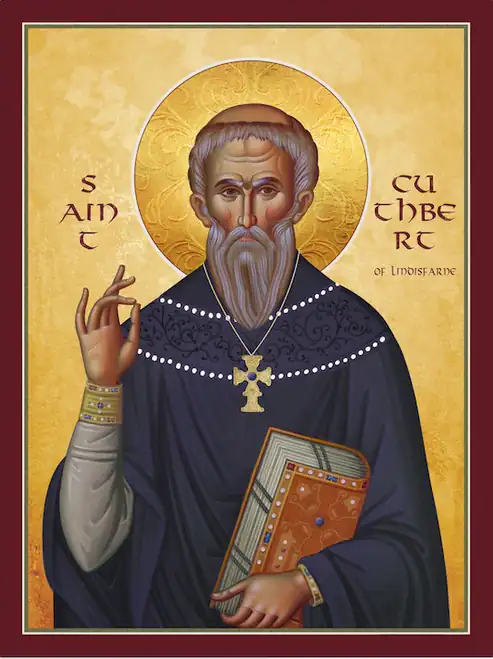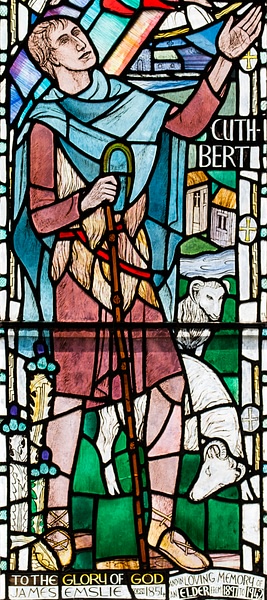Who was Saint Cuthbert?

St. Cuthbert was born in the British Isles. He was a poor shepherd boy whio lost his parents when he was very young. Cuthbert loved to play games with his friends and he was good at them.
One of his friends scolded him one day saying, “Cuthbert, how can you waste your time playing games when you have been chosen to be a priest and a bishop?” These words sounded strange coming from his playmate – as though they were not his own. Cuthbert was confused and very impressed and he wondered if he really was going to be a priest and a bishop.
In August, 651, 15 year old Cuthbert received a vision. He first saw a totally black sky. Then suddenly a bright beam of light moved across it. In the light were angels carrying a ball of fire up beyond the sky. Sometime later, Cuthbert found out that on the night of the vision, the bishop, St.Aidan, had died.
'Be bold, be strong, for the Lord your God is with you' (Joshua 1.9)
From one village to another, from house to house, St.Cuthbert went on horse or on foot. He visited the people to help them spiritually. He also worked and helped plague victims. Best of all, he could speak the language of the peasants because he had once been a poor shepherd boy.
He did good everywhere and brought many people to God. Cuthbert was cheerful and kind. People felt attracted to him and no one was afraid of him. He was also a prayerful, holy monk who had the gifts of healing and prophecy.
When Cuthbert was ordained a bishop, he worked just as hard as ever to help his people. He visited them no matter how difficult the travel on poor roads or in bad weather. As he lay dying, Cuthbert begged his monks to live in peace and charity with everyone.
He died peacefully at Lindesfarne, in 687. His body has been laid to rest in Durham Cathedral and can be visited today.
CUTHBERT WAS EIGHT YEARS OLD WHEN HE BEGAN EXPERIENCING A SERIES OF MIRACLES WHICH ULTIMATELY LED HIM TO PURSUE HIS MONASTIC CAREER.

'Be bold, be strong, for the Lord your God is with you' (Joshua 1.9)
Saint Cuthbert was born into a time of great change and struggle in English history. Born at a time when England was still divided into several Anglo-Saxon kingdoms, St Cuthbert was born into the most northern of these: Northumbria. Thanks to the hard work and missionary zeal of St Aiden, St Hilda and other great missionaries a generation earlier, much of Northumbria was now Christian. The struggle, however, was that many pagans resented the new Christian communities and the feudal politics were as cut-throat as ever. It was into this backdrop that St Cuthbert was born to a noble family a mere ten years after King Edwin had converted in AD 627.
Called to serve
In his early life, it is believed that St Cuthbert spent some time serving in the military. While details are very scarce on his life at this time, we know that even early in life he was a devout Christian and had a very deep and personal faith.
On the night of St Aiden’s death, Cuthbert’s life took at drastic change. Receiving a vision, he felt called by God to become a monk and serve as a missionary; spreading the truth and love of the Christian faith. Not long after, he joined a monastery in Ripon and became an inspirational brother.
He was well-known as a travelling priest spreading the Christian message to remote villages, but also was well able to impress royalty and nobility. Reportedly performing several miracles during his life, St Cuthbert’s most compelling traits were how passionately he seemed to live the message he preached and the peace and completeness this seemed to give him.
St Cuthbert’s fame for piety, diligence and obedience quickly grew. His reputation for gifts of healing and insight led many people to consult him, gaining him the name of “Wonder Worker of Britain”. His missionary zeal saw him travel vast distances across the country and his natural charm made him welcome wherever he went.
A striving heart for God
Despite all this, St Cuthbert’s highest concern was not being in the public eye but rather developing the communion he had with God. With his abbot’s leave, he moved out into the wilderness to live a life a great austerity and solitude. Many still sought after his wisdom and advise but for the most part he spent his life in constant prayer for himself and others.
Called to lead
It wasn’t long, however, before he was called upon again to take up a more active role in the world. When the time came for a new bishop to be appointed, people were desperate for Saint Cuthbert to take up the role. Initially, he resisted. Being a humble and simple man, he didn’t consider it his place to hold such an important role. It was only after a visit from a large group of delegates, including the king, that he eventually accepted the role.
For several years he actively embraced his role as bishop and, like before, did much to support the poor and bring the good news to many. Eventually, however, St Cuthbert felt called to return to his life as a hermit. There he lived out the rest of his life in his cell on Inner Farne Island.
Why Saint Cuthbert is inspiring
A reflection
St Cuthbert inspires us mostly because of his humility and discernment. He challenges us to be constantly open to what God is asking of us and to always prioritise developing a relationship with Him.
He shows us how to be brave and to reach out to those around us, to make a difference by standing up to what we know is right.
'Be bold, be strong, for the Lord your God is with you' (Joshua 1.9)
We have always been awed by those who give up everything for their faith and there is no greater example of this than becoming a hermit. The fact that St Cuthbert would prefer to live in complete isolation, with nothing but prayer to fill his time, is a beautiful example of how important prayer is and how much it fulfils our lives.
We relate to St Cuthbert as he lived on an island, just like we do on the Isle of Axholme. Like Srt Cuthbert we use our values of Love, Trust, Peristnece, Wisdom and Hope to flourish in this beautiful world made by God.